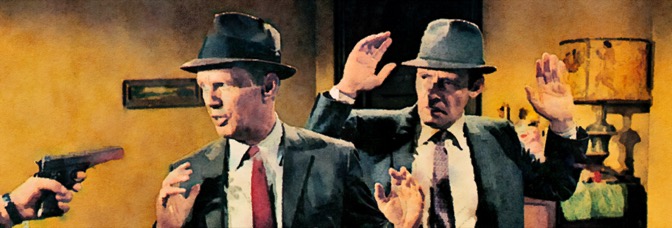Madigan ends really well, deceptively well, but the whole film is rather well-written. The problems are plot and production related. I suppose there’s some problems with unbelievable character relationships too–for example, Richard Widmark’s workaholic cop and Inger Stevens’s would-be social climber are never a credible couple. There’s also a big problem with the brief implication Widmark is overcompensating for some (undisclosed) character flaw, something related to Henry Fonda’s police commissioner.
Besides Stevens’s poor turns in the first half (it’s not really her fault, the writer’s just can’t make her character work), everyone else is excellent. Widmark’s great, Fonda’s exceptional and–as far as I know– it’s Harry Guardino’s biggest role. James Whitmore is excellent, as is Susan Clark. The standout, acting-wise, is Don Stroud, who’s fantastic as a big dumb lug.
The last paragraph’s glut of positive adjectives is to make up for this paragraph’s expected lack of them. Even though Madigan is beautifully filmed in New York (except the night scenes, which switch noticeably over to a backlot), Don Siegel just doesn’t know what to do with the script. Madigan‘s a cop movie from the 1970s made with 1960s filmmaking mores. The location shooting works, but the film stock changes when it goes to set. The way Siegel sets up his interior scenes, in widescreen Techniscope, is poor. He either centers his subjects or he spreads them out. For instance, Widmark and Guardino are talking on the left side of the frame while there’s a guy being mirandized on the right. Siegel fills the empty space with the arrestee, when it’s clear he’d rather have him in the background. Having read Siegel’s autobiography, I know he hated widescreen–he got over it for Dirty Harry to say the least, but here, it’s very clear he’s unhappy with it.
But the film’s not poorly directed, oddly enough. It just doesn’t work right. Fonda’s side stories with Whitmore and Clark are far more interesting than Widmark’s search for the crook who’s got his gun. Even Stevens’s eventual flirting with adultery (a big theme–Clark is a society wife bedding widower Fonda) is more interesting and far more effective. It’s an adult drama fused to a cop programmer. The scenes with Fonda and Clark are amazing, as is some of the dialogue in the conversations, which is what kept me enthused throughout the boring plot. The dialogue’s incredibly insightful and human.
The whole thing would probably work better with every scene related to the “A plot” excised. It’d probably only take off twenty minutes too. Oh, and if not for Don Costa’s bombastic, over-the-top score.

Leave a Reply